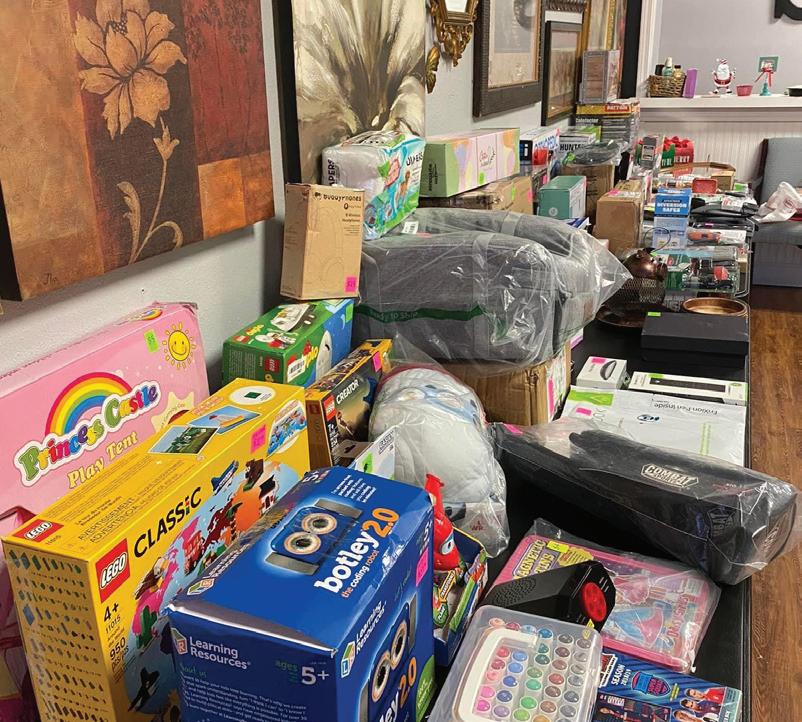
7 minute read
The Science of Math
THE SCIENCE BY DONESA WALKER BY DONESA WALKER OF MATH
RECENTLY PHRASES LIKE “FOLLOW THE SCIENCE” AND TERMS LIKE “SCIENCE OF READING”
→ → Strategies (Formulating, Strategies (Formulating, representing, and solving problems) representing, and solving problems) → → Reasoning (Reflecting, explaining, Reasoning (Reflecting, explaining, and justifying) and justifying)
HAVE BEEN BANDIED ABOUT CAUSING EXTREME CONFUSION. Understanding what these phrases mean can be a game changer in the approach to implementation of these skills.
What is the Science of Math? The science of math according to various resources is much like the science of reading. It is a proficiency-based movement focused on using objective evidence (data) about how students learn math in order to make how students learn math in order to make educational decisions and to inform policy educational decisions and to inform policy and practice. According to the research and data (the science), math proficiency is and data (the science), math proficiency is a blending of: a blending of: → Concepts (Understanding concepts, operations, and relations) → Procedures (Using procedures flexibly, accurately, and efficiently) → → Disposition (Seeing math as Disposition (Seeing math as sensible, useful, and worthwhile. sensible, useful, and worthwhile. → → Thinking processes (Attention, Thinking processes (Attention, memory, processing, etc.) memory, processing, etc.)


Cognitive skills weaknesses that may affect math proficiency include logic and reasoning skills, memory, attention, processing speed, visual spatial processing, and reading skills. Students and adults who struggle with thinking processes inherently struggle with math and science. STEM movement or STEAM (science, technology, engineering, art, and math) as it has become is driven to provide more resources and opportunities to students to engage in processes that will invite them to explore and experience in an engaging
way such as at SciPort or the Shreveport Aquarium. Providing more access to these is an amazing goal and a great community effort which all should be a part of to boost our academic growth, but it is also important to be aware of the challenges that many students face in accessing their own thinking abilities. As educational standards and boundaries Cognitive skills weaknesses that may shift from political to community efforts affect math proficiency include logic and engagement, it is important that the and reasoning skills, memory, attention, overreaching purpose remain focused processing speed, visual spatial processing, and reading skills. on what changes are being made to the underlying issues of learning. Learning builds on a foundation of strong thinking Students and adults who struggle with processes. When the foundational skills thinking processes inherently struggle are weak, learning is difficult. A student with math and science. STEM movement who struggles to understand abstract or STEAM (science, technology, concepts such as why letters (variables) engineering, art, and math) as it has are in math, will struggle early on with become is driven to provide more simple concepts of sorting, patterning, resources and opportunities to students to reading a clock and money. When a child engage in processes that will invite them struggles with these issues, tutoring often to explore and experience in an engaging isn’t enough.
way such as at SciPort or the Shreveport Aquarium. Providing more access to these is an amazing goal and a great community effort which all should be a part of to boost our academic growth, but it is also important to be aware of the challenges that many students face in accessing their own thinking abilities. As educational standards and boundaries shift from political to community efforts and engagement, it is important that the overreaching purpose remain focused on what changes are being made to the underlying issues of learning. Learning builds on a foundation of strong thinking processes. When the foundational skills are weak, learning is difficult. A student who struggles to understand abstract concepts such as why letters (variables) are in math, will struggle early on with simple concepts of sorting, patterning, reading a clock and money. When a child struggles with these issues, tutoring often isn’t enough.



Dyscalculia is a learning issue in mathematical concepts much like dyslexia is to reading. When a person struggles to make sense of mathematical processes from counting to number sense early on, they may have a learning difficulty that should be addressed in order to avoid future delays. While it is estimated as much as 15-20% of the population has dyslexia, the estimate for dyscalculia is 7%. While one may not think this is much, consider that only 8% of the USA population struggles with ADHD and yet Louisiana has the highest percentage (15.7%) of children diagnosed with ADHD in the nation. Addressing the underlying concerns that affect math could also address much of the attentional issues as these are often referred. Students who struggle to learn have a hard time paying attention. Many times, weaknesses in learning processes are misdiagnosed as attention issues because they appear to be attention issues and affect focus. Interestingly enough, according to research, ADHD is associated with other neurological and psychiatric disorders. More than 60% of individuals suffering from ADHD present with one or more other issues that affect mental health like oppositional defiant disorder, conduct disorder, depression, anxiety, and tic disorders. 60% of children exhibiting ADHD are also affected by learning disorders like dyslexia or dyscalculia. How’s that for science? Research shows that learning struggles such as ADHD, Dyscalculia and Dyslexia affect mathematical ability. Addressing the underlying learning challenges starts with first being aware of them by assessing and knowing where the struggles are. The process is really a lot like a screening for vision. It is a simple assessing of cognitive skills or thinking ability. These assessments can be in depth or simple screenings to see if
Dyscalculia is a learning issue in mathematical concepts much like dyslexia make sense of mathematical processes from counting to number sense early on, they may have a learning difficulty that much as 15-20% of the population has dyslexia, the estimate for dyscalculia is 7%. While one may not think this is much, consider that only 8% of the USA in the nation. Addressing the underlying concerns that affect math could also address much of the attentional issues as these are often
there is a potential problem. Struggling with learning of any type should not be a lifestyle especially when there is help because they appear to be attention issues available in the community. and affect focus. Interestingly enough, with other neurological and psychiatric health like oppositional defiant disorder, conduct disorder, depression, anxiety, and tic disorders. 60% of children exhibiting ADHD are also affected by learning disorders like dyslexia or dyscalculia. How’s that for science? Research shows that learning struggles such as ADHD, Dyscalculia and Dyslexia affect mathematical ability. Addressing the underlying learning challenges starts with first being aware of them by assessing and knowing where the struggles are. The process is really a lot like a screening for vision. It is a simple assessing of cognitive skills or thinking ability. These assessments can be in depth or simple screenings to see if there is a potential problem. Struggling with learning of any type should not be a lifestyle especially when there is help available in the community.
Donesa Walker, M. Ed. is the owner of Donesa Walker, M. Ed. is the owner of LearningRx of Shreveport, a Master LearningRx of Shreveport, a Master Reading/Dyslexia Specialist, and a Board Reading/Dyslexia Specialist, and a Board Certified Cognitive Specialist. Certified Cognitive Specialist.





Humbly Hidden Treasures LLC has everything from a thrift store, boutique clothing, jewelry, and shoes to new items from Amazon, Staples, Lowes, and Walmart (at a 50% discount or more discount)! Come by and see us today!
1605 Benton Road Suite M Bossier City, LA • 318-317-6500 humblyhiddentreasures.square.site Find us on Facebook











